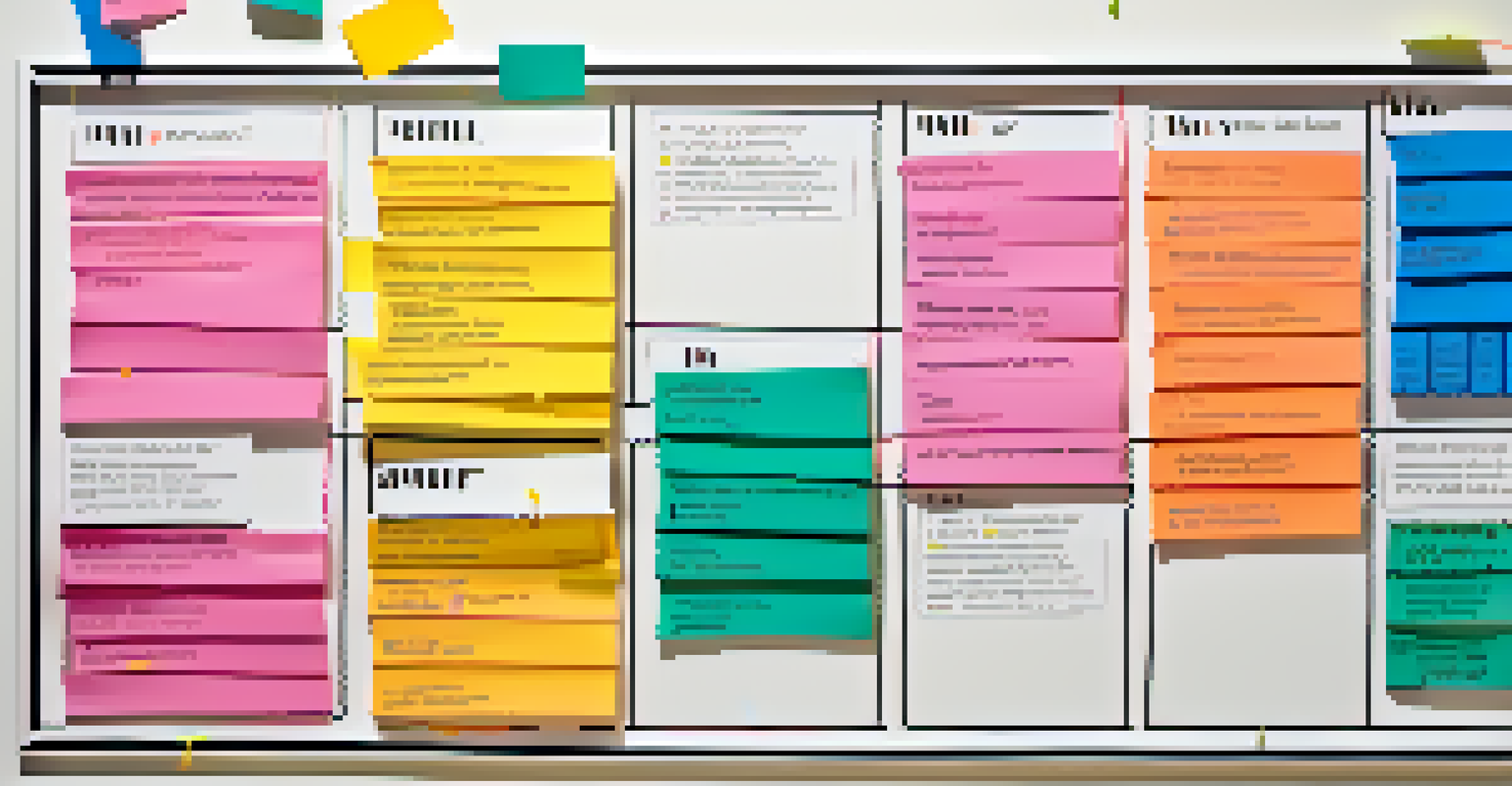Creating an Accountability System for Habit Development

Understanding the Importance of Accountability in Habits
Accountability is a powerful tool when it comes to habit development. It adds an extra layer of commitment that helps you stay on track with your goals. Think of it as having a supportive friend who checks in on you, gently nudging you toward success.
Accountability breeds response-ability.
When you know someone else is aware of your goals, it can motivate you to push through challenges. This social pressure, when framed positively, can be the difference between giving up and persevering. Just like how a workout buddy can inspire you to hit the gym, an accountability partner can keep you focused on your habits.
Ultimately, accountability fosters a sense of responsibility, making you less likely to abandon your progress. By understanding its importance, you can harness it to create lasting change in your life.
Identifying Your Goals and Habits for Accountability
Before you can create an accountability system, it’s essential to identify the specific habits you want to develop. Are you looking to exercise regularly, read more, or eat healthier? Clarifying your goals helps you set a clear direction for your accountability efforts.

Once you’ve pinpointed your habits, write them down. This simple act not only reinforces your commitment but also gives you a tangible reference point as you progress. It’s like having a map on a road trip; you need to know where you’re headed to stay on course.
Accountability Boosts Habit Success
Having an accountability partner can significantly enhance your commitment and motivation to develop new habits.
By outlining your goals clearly, you create a solid foundation for your accountability system. This clarity will guide your actions and keep you focused on what matters most.
Choosing the Right Accountability Partner or Group
Selecting the right person or group for accountability can make all the difference. Look for someone who shares similar goals or values and can offer encouragement and constructive feedback. This could be a friend, family member, or even an online community.
The secret to success is accountability. When you have a group of people focused on the same goals, it becomes easier to achieve them.
The ideal partner is someone who is not only supportive but also willing to check in regularly. Think of this person as your habit cheerleader, someone who celebrates your victories and helps you troubleshoot setbacks. Just as in sports, a good coach can elevate your performance.
Don’t hesitate to explore various options until you find the right fit. The more aligned you are with your accountability partner, the more effective your system will be.
Setting Up Regular Check-Ins for Progress Tracking
Consistency is key when it comes to accountability, and setting up regular check-ins can help maintain that momentum. Whether it’s a weekly phone call or a monthly coffee date, these meetings should be dedicated to discussing your progress and challenges.
During these check-ins, share your wins and areas where you need to improve. This open communication fosters a sense of trust and partnership, making it easier to tackle obstacles together. It’s similar to having a scheduled meeting at work—regular updates keep everyone on the same page.
Set Clear Goals for Better Focus
Clearly identifying and writing down your goals lays a solid foundation for an effective accountability system.
Remember, the goal is to support each other, so keep the atmosphere positive and constructive. These regular touchpoints will help solidify your commitment and encourage continual growth.
Creating a Reward System to Celebrate Progress
A reward system can be a fantastic motivator, especially when developing new habits. By setting up small rewards for achieving milestones, you create positive reinforcement that encourages you to keep going. This could be treating yourself to a movie or enjoying a special meal after reaching a goal.
Think of it as giving yourself a pat on the back for a job well done. Celebrating small victories can help maintain your enthusiasm and remind you of why you started in the first place. It’s like a mini party for your achievements, reinforcing the idea that progress is worthy of celebration.
When you make rewards a part of your accountability system, you create a more enjoyable experience around habit development. This approach not only keeps you motivated but also makes the journey feel more fulfilling.
Overcoming Obstacles with Your Accountability System
Everyone faces obstacles on the path to habit development, and having an accountability system can help you navigate these challenges. When setbacks occur, your accountability partner can offer support and guidance, helping you to brainstorm solutions or alternate strategies.
Instead of viewing obstacles as failures, see them as opportunities for growth. This mindset shift can make a world of difference in how you approach challenges. Just as a river finds its way around rocks, you too can adapt and keep moving forward.
Celebrate Progress with Rewards
Implementing a reward system for achieving milestones helps maintain enthusiasm and reinforces positive habit development.
By viewing obstacles through this lens and utilizing your accountability system, you create a resilient approach to habit development. Remember, it’s not about perfection; it’s about progress and learning along the way.
Reflecting and Adjusting Your Accountability System
As you progress in habit development, it’s crucial to reflect on your accountability system and make necessary adjustments. Take time to evaluate what’s working and what isn’t. This reflection ensures that your system remains effective and continues to meet your evolving needs.
Consider asking your accountability partner for their feedback as well. They may have insights that can help you refine your approach. Just like a gardener prunes plants for better growth, you too can prune your system for optimal results.

Flexibility is key; what worked at the beginning may need tweaking as you grow. By committing to regular reflection and adjustment, you’ll ensure your accountability system remains a powerful ally in your journey toward habit development.